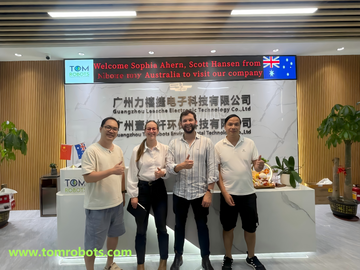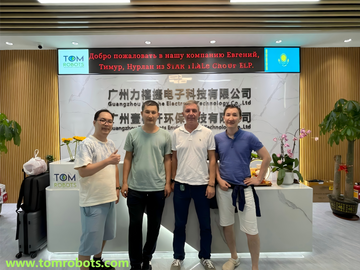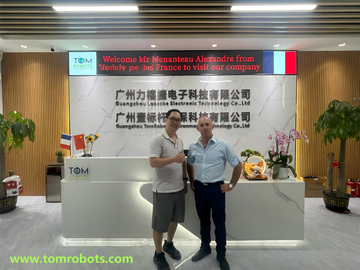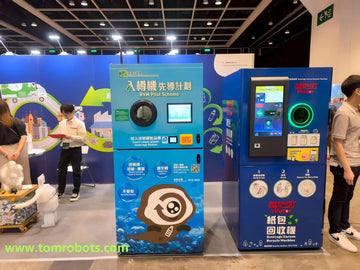Honorable Australian customers Tour TomRobots: Advancing Tech Innovation and Eco-Friendly Efforts Together
presso TomRobots su Oct 07, 2025

In late September 2025, TomRobots hosted Sophia and Ahern, Australian traders specializing in beverage recycling equipment, for in-depth technical exchanges. The visit centered on a core question: how to solve the practical challenges in Australia’s recycling industry through efficient reverse vending machine, plastic bottle recycling machine, and can bottle recycling solutions. Through on-site demonstrations and technical discussions, the two traders gained first-hand experience of how TomRobots’ products address key industry pain points, providing them with fresh ideas for finding suitable suppliers and laying an important foundation for future cooperation between the two parties.
Key Challenges in Australia’s Beverage Container Recycling
Australia faces three core obstacles in improving beverage container recycling rates. First, the long-standing issue of material mixing: consumer disposal behavior often leads to mixed discards of PET plastic bottles, aluminum cans, and glass bottles, yet most existing recycling equipment lacks the ability to efficiently sort multiple materials. “We have tested several plastic bottle recycling machine units, but they cannot handle cans or glass, forcing us to purchase additional dedicated equipment,” explained Ahern. Second, outdoor durability is a major concern: Australia’s intense sunlight, high temperatures, and occasional extreme weather cause many reverse vending machine units to age rapidly, significantly increasing maintenance costs. Third, logistical inefficiency plagues can bottle recycling: unsorted and uncompressed cans take up large amounts of space during transportation, driving up fuel and storage costs for recycling operators.
These challenges align with data from Australia’s recycling industry reports: currently, only 45% of beverage containers are recycled, and 30% of recycling facilities cite “equipment performance limitations” as the top barrier to improving recycling rates . For traders like Sophia and Ahern, finding a solution that addresses all three pain points is crucial to meeting market demand—and the adaptability of TomRobots’ equipment demonstrated during the visit gave them a clear path forward.
How TomRobots’ Equipment Addresses These Challenges
During the visit, TomRobots used product demonstrations to visually show how its equipment specifically solves Australia’s recycling problems—starting with multi-material sorting, a core market demand. The key equipment featured in the demonstration, the Model L88 reverse vending machine, adopts dual-camera AI recognition technology to accurately distinguish between PET plastic, aluminum, and glass materials. Unlike traditional plastic bottle recycling machine designs that rely on single-material sensors, the L88’s algorithm achieves a 99.7% recognition accuracy even for slightly damaged containers (such as dented cans or scratched plastic bottles). “We put in a mix of wet plastic bottles, crushed cans, and small glass jars—scenarios that usually cause confusion for other machines—but the L88 completed perfect sorting,” said Sophia. “This eliminates the need for manual pre-sorting, saving us time and labor costs, and fully meets the operational needs of the Australian market.”
For can bottle recycling specifically, the built-in compression system of the L88 is a standout feature. After sorting, the equipment can compress aluminum cans to 30% of their original volume—a design that directly solves the problem of inefficient recycling logistics in Australia. “Transporting loose cans costs us approximately \(0.15 per kilogram in storage and fuel,” calculated Ahern. “If we can reduce the volume by 70%, the cost drops to nearly \)0.05. For large-scale operations, this is a substantial savings and will give us a competitive edge in the market.” The compression mechanism is also equipped with a safety lock to prevent jamming—a common issue with low-cost can bottle recycling equipment—further highlighting the reliability of TomRobots’ products.
In terms of outdoor durability, staff demonstrated the performance of the Model RVM135 reverse vending machine through simulated environmental tests. The equipment’s exterior is made of 304 stainless steel with a UV-resistant coating, and its internal components are sealed to prevent damage from dust and moisture—features that perfectly adapt to Australia’s harsh climate conditions. “We showed the traders laboratory test data: the RVM135 can operate continuously within a temperature range of -5°C to 45°C without performance degradation,” said a TomRobots engineer. “Most plastic bottle recycling machine units on the market start to malfunction when temperatures exceed 35°C, which is a major problem in Australian summers—but the RVM135 can fully handle it.” Sophia added, “In the past, due to sun damage, we had to replace equipment parts every three months, resulting in high maintenance costs. A durable machine like the RVM135 can help us reduce maintenance costs by at least 50%, which is crucial for long-term operations.”
The Value of Original Manufacturing for Australian Traders
A key focus of the exchanges was exploring why TomRobots, as an original manufacturer, holds significant value for Australian partners. Unlike suppliers that rely on outsourced production, TomRobots controls the entire production process—from component sourcing to quality inspection. This model enables flexible customization of reverse vending machine units to meet Australia’s unique needs, such as integration with local refund apps.
Take the Model RVM100 as an example: this equipment can be modified to support Australia’s “Recycle Rewards” program—users scan a QR code on their mobile phones, insert containers, and receive refunds directly into their app wallets. “Many suppliers claim to offer customization services, but they fail to deliver because they do not control the production process,” explained Sophia. “TomRobots showed us that they can complete software adjustments for the RVM100 within a week—something that would take other companies months. This efficiency is crucial for us to quickly expand into new regions and also demonstrates the flexibility of potential cooperation.”
Original manufacturing also ensures quality consistency—a key concern for traders who have experienced inconsistent quality across batches from outsourced suppliers. “Some of the plastic bottle recycling machine units we received worked well, while others malfunctioned within weeks, causing us a lot of trouble,” said Ahern. “TomRobots’ in-house testing system ensures every machine meets uniform standards. This reliability is essential for us and a key reason we are willing to pursue in-depth cooperation.”
Follow-Up Plans: Clear Intent to Cooperate After Client’s Review in Australia
After the visit, Sophia and Ahern returned to Australia with plans to first share TomRobots’ equipment data, demonstration videos, and test reports with local core clients (including local municipal authorities and supermarket chains) to gather specific feedback on equipment application scenarios. At the same time, they proposed further collaboration with TomRobots’ technical team to refine testing plans for glass bottle handling—since glass bottles are fragile and require higher sorting accuracy, the two parties will jointly optimize equipment parameters to ensure full adaptation to Australian market needs.
Before returning, Sophia clearly stated: “TomRobots is not just selling reverse vending machine units—they are providing solutions to our specific problems. After this on-site inspection, we have full confidence in the equipment’s performance, customization capabilities, and durability. Once we complete feedback collection from domestic clients, we have a strong intent to advance formal cooperation with TomRobots. After all, equipment that can solve Australia’s recycling pain points is not common in the market.” Ahern added, “From original manufacturing capabilities to after-sales service guarantees, TomRobots has demonstrated professional standards. We will sort out the cooperation framework as soon as possible after returning and hope to introduce this equipment to the Australian market at an early date.”
For TomRobots, this visit not only confirmed the importance of regional product customization but also laid a solid foundation for expanding into the Australian market. “Australia’s recycling challenges are unique, and our equipment was designed with adaptability in mind,” said a company representative. “Cooperating with traders like Sophia and Ahern will help us further optimize our solutions—allowing our reverse vending machine, plastic bottle recycling machine, and can bottle recycling systems to better serve global clients and drive the development of the circular economy.”
Solve Your Recycling Challenges with Us
Are you a trader or municipal authority struggling with multi-material sorting, equipment durability, or recycling logistics costs? TomRobots’ original-manufactured reverse vending machine, plastic bottle recycling machine, and can bottle recycling solutions are specifically designed to address these pain points. Contact us today to discuss how we can customize equipment to meet the needs of your market and start a new chapter of win-win cooperation.



